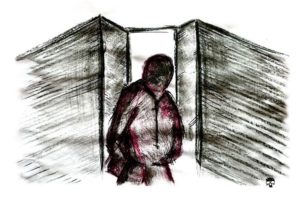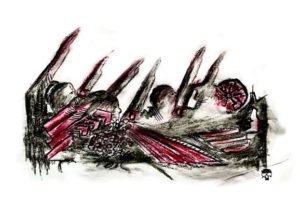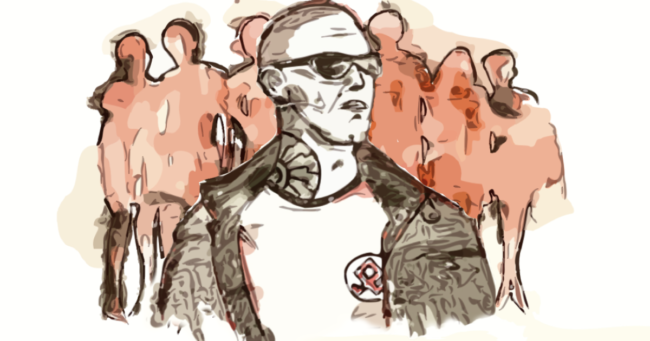Hate, Violence and Megalomania (2/3)
From Military to Brotherhood (2/3)
By Ferdinand.
Verfasst von Fabian Wichmann und Felix Benneckenstein. German version.
Ferdinand had joined the far-right Scene of Germany during his early teenage years. Motivated by an ideologically charged interest in militarism and the sanctification of fallen German soldiers (during World War II), he continued to further radicalize himself. He used to be a member of different Neo-Nazi groups, participated in violent crime, which only ended when he left the scene after he had been a member of a fascist “Brotherhood”.
In the following he will give insight on his former life from his time in the military, the role of far-right music and life in extremist hate-groups. A life filled with hate, violence and illusions of grandeur.
Between two worlds
After my military service I moved back in with my parents. I could have gone to study at university, but decided to work in manual labor. This sector enabled me to have a steady income without any further training. During this time, I traveled between two worlds, one my family home, the other my “comrades”. I became a so-called “prospect” of the group I “hung out with”. This gave me an immense sense of pride. The group was considered to be “the elite” of the local Neo-Nazi-scene. A group which one could not simply join but who asked people whom they deemed “worthy” to be part of their “circle”. This made the world of my parents even less important and I invested all of my leisure time in this group and their corresponding “Weltanschauung”. Possible consequences of this decision were irrelevant to me at the time.

The Day of the Rope or Day X[1]
The clubhouse was the focal point of all our activities. What concerts to visit was a regular topic but it didn’t stop there.
When we went to Switzerland or the Czech Republic, we also often used the opportunity to visit the shooting range. Now, was this a preparation for armed conflict for every member? I don’t know. For some it was probably just a “fun activity” or just “something to do” but for many it was a training to use weapons “when necessary”.
The coming “race war” is an important issue for many Neo-Nazis. They stock up supplies and train using weapons. It is an integral part of the propaganda one is exposed to and therefore often discussed within right-wing groups.
However, because of the terrorist attacks by other Neo-Nazis and the increased government surveillance has led many inside of the scene to become more careful. Usually members try to have weapons at home which are, at least, on the verge of legality.[2] So, one would not find an illegal firearm hidden under a Nazi’s pillow, behind his swastika flag or underneath a Hitler portrait. They are usually hidden somewhere outside of the home to make them harder to find for authorities or to trace them back to any individual.
The Role of the “Brotherhood”
Clubs like mine are of immense importance for the right-wing music scene in Germany. They are, as mentioned above, people one aspires to be. German authorities often try to ban these types of organizations which is not as easy as it sounds. One example would be Blood and Honor. It was banned in the early 2000s but, of course, the members were still around. They might have lost their clubhouse, but could easily meet at in clubhouses of other Nazi groups or in bars which sympathize with their ideas.
Their influence can be so strong that some clubs basically control the far-right scene in some regions of Germany.
When it comes to the day-to-day operations of the far-right, political organizations also make use of the „Brotherhoods“. They have real estate which can be used for rallies, provide security, or simply take care of the catering. Examples can be seen at almost every far-right event in Germany for example during NPD or the III. Weg[3] gatherings.
The reason why they are some important for these organizational activities are manifold and will be explained in the following: The clubs have a violent reputation which make them ideal candidates to provide security for any type of right-wing extremist events, but usually also have connections to Neo-Nazi musicians which enable them to provide organizers with these musicians.[4]An example would be the group “Lunikoff Verschwörung“.[5] The group is closely tied to the “Vandalen“ from Berlin. Some clubs even host their own gigs like the Hammerskins and their annual “Hammerfest“.
Everything “right as rain“
Even though most of these groups are fairly similar when it comes to their ideology, one should not assume that they are also allies when it comes to the day-to-day activities. There is constant provocation and a feeling of superiority regarding others. Even with the strict hierarchy most clubs have, this is even true inside of them and prevent the far-right scene in Germany from ever being the united front they want the outside to see them as. During my deradicalization process, I began to see these workings and that most of the posturing presented is a way of self-aggrandizement.
Hate Music in Germany
For many and for me as well music was the “gateway drug“to enter the scene. As a teenager it was a means of rebellion, but in the course of my “career“within the scene it became my ideological basis. However, for many people involved in that scene, it is nut just a means of spreading their message. It is also their means of income.
It is impossible to say how much money is being made in that market exactly. When it comes to concerts, there are almost never any written contracts. The same holds true for record deals. Right-wing music in general is a “gray area“ and everyone is trying to keep their hands as clean as possible to avoid possible persecution. Be it for hate crimes or tax evasion. Where I can give more insight is to how the organization and execution of music gigs actually work which I will do in the following:
First of all, most concerts take place outside of Germany and serve as means to see one’s favorite bands, but also as a possible to network among st other extremists. If concerts do take place in Germany, extremists apply a variety of means in order to hold their event. If a gig is considered legal then the concert will be declared to the authorities with a list of bands and the songs they will be performing. If a concert is considered to be illegal the goal is to make it as difficult as possible for the police to intervene. One example would be to declare the event as a private party (for example a birthday party) or hold it on private property.[6] Another method is to make it difficult for the authorities to even know of the event or the location of the event beforehand. This is done to prevent police presence in the first place or to prevent them from gathering enough personnel to stop the gig. The first concert where I was actively involved in the planning was around 2010 in Germany. Since we did not have our own location, we were forced to find one. Through the use of straw men we were able to rent a space at a local youth club. One of the bands that played that night was already under police investigation which is why they performed anonymously. The concert was able to take place which was a huge win for us and a win to show that we as an organization to pull it off.

Between Brotherhood and Politics
The clubs which I am talking about, as mentioned before, consider themselves to be the “elite“ among the right-wing, but do not see themselves as political activists per SE. They do not engage in political discourse or take part in day-to-day politics. But they are still deeply political in nature. Inside of the groups, political discussions are common place. These discussions however do not strive to find solutions to everyday issues, but rather to reinforce the ideology by exaggerating everyday occurrences to a much larger scale. An example would be when the dam of the Elbe River broke and caused flooding near Dresden. Members of the clubs saw this event as “planned“ by sinister forces to accomplish some sort of goal.
When entering a Neo-Nazi clubhouse however one would rarely find any political references. Especially Third Reich symbols[7] are not be shown or even stored in club locations. The reason for this is rather simple: It is to prevent police raids and to not give federal authorities any reason for seeking an outlawing of the group. This also holds true for the public presentation of the members. If members decide to go to political demonstrations, they are told to present themselves in a moderate fashion and not display any of the clubs insignia to uphold the secrecy of the club and also to appeal to the population. These laws have intensified in the past years, especially since many clubs have begun to work with other organized crime groups.
Illusions of Grandeur
Everything I have written so far was absolutely normal behavior for me at the time and this changed me as a person. From today’s perspective I can say that I and many other members of my club were suffering from illusions of grandeur. Because I had this group and my position in this group, I considered most other “normal people“ as inferior to me. Therefore also, the rules of society did not apply to me as well. I and by extensions my club could do whatever we wanted to do. That is at least what we thought.
Now to be clear, this feeling of invincibility did not apply inside of the club. Here it was very clear who was in charge and who had to obey. This made my need to show this perceived superiority to the “others“ even stronger. With “others“ I would refer to anyone who was not part of the club. While animosities were usually the limit concerning other members of the right-wing scene, words were not enough when it came to ideological and perceived enemies who I did not view as people at all.
While I still participated in demonstrations where I came into conflict with members of the local Antifa, most people around me did not join me there. For me it was important to express my political opinion or rather my Weltanschauung because, as mentioned before, the day-to-day aspect of politics was not important to me. Where me and most of my former „comrades“ inflicted violence on other people were bars. These attacks were not planned attacks such as on locales of the political opposition, but happened rather spontaneous. Today I would describe my violent behavior as a need to be the „alpha-male“, showing that an area was „ours“.
Constant Violence
Almost every bar gave us the opportunity for violence. As mentioned before, planning was usually not involved, it was the case that we were simply looking for a chance to engage in fights or to “test our strength“. At the time, I trained quiet excessively. Boxing, MMA and weight training were all part of my program to be able to “defeat“ anyone who I designated as my opponent for that night.
Again for me this was normal behavior. Testing oneself for the moment when me and others like me would have the chance to take control of the government. During these moments I did not care for the person I was hurting. Fueled by the ideology, the music, the idea of being above the law, is why I thought I was invisible. Plagued by illusions of grandeur, not realizing what I had lost already.
The three-part text is based on an interview conducted by the case supervisors of EXIT Germany. For reasons of personal protection, places and names have been anonymised.
Illustrations: Fabian Wichmann / Text: Fabian Wichmann and Felix Benneckenstein based on several interviews with Ferdinand.
[1]Day X(“Tag X”) is a reference to the day on which the current democratic system of government collapses and the far-right takes power by force. In the English-speaking world, this term was coined “Day of the Rope” in the “Turned Diaries”.
[2]Germany, in comparsion to other countries, has very strict gun laws. These, for example, ban extremists from owning firearms of any sort.
[3]NPD: Nationalist-Democratic Party / III.Weg: The Third Way (referencing National Socialism as the “third way“ between capitalism and communism). Both parties are considered to be right-wing extremist by the German authorities and are under surveillance. NPD was almost banned in Germany, but the highest German court (Bundesverfassungsgericht) dismissed the case because the party was too small to actually pose a danger to German democracy.
[4]It should be noted that Germany has, like every democratic country, limits on freedom of speech. These include glorifying the Third Reich, showing/using Nazi symbols/slogans etc. This makes it impossible for many of these musicians to openly advocate for their gigs.
[5]A group which is considered to be the successor of the outlawed band “Landser“.
[6]This is because of the German law which differentiates between public and private events. Simplified the police must be given access to all public events but requires a warrant for private events or to search a private residence.
[7]Which are forbidden by law to be displayed other than for educational purposes.
Podcast zum Thema Ausstieg


